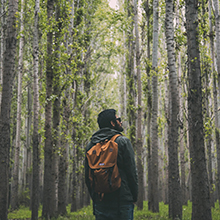Your brain on nature: How the world can help you heal
 David Strayer is professor of cognition and neural science at the University of Utah.
He told me that our increased screen time has led to more multi-tasking, and the combination
puts a strain on our brains. "One of the best solutions we've found is to set that
aside and go out and walk for a bit. You don't then use those prefrontal regions of
the brain to try and multitask," he says.
David Strayer is professor of cognition and neural science at the University of Utah.
He told me that our increased screen time has led to more multi-tasking, and the combination
puts a strain on our brains. "One of the best solutions we've found is to set that
aside and go out and walk for a bit. You don't then use those prefrontal regions of
the brain to try and multitask," he says.
"That's why we see these bursts of creativity after you've set a problem aside for a while. You're letting the brain rest. What we're seeing is that if you're walking in a busy urban area with lots of traffic and things you have to interact with, lots of man-made things, that's probably not going to be so restorative. The best place to do it is in a park, or you can go on a hike in the bush, where you can kind of get away from it all."
